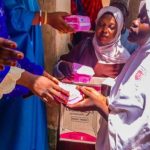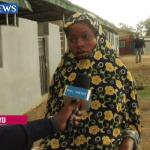The United Nations Children’s Fund estimates that One in 10 African girls misses school during their periods, which means they fall behind in their studies and often drop out of school.
This is why experts have called on the government of Nigeria to create women friendly policies and ensure their enforcement to deal with menstrual poverty in the country.
Helen Osamede-Akins reports.
Menstruation is a normal physiological process that begins in girls during adolescence.
Millions of girls around the world have no idea how to manage it safely and hygienically when they get their first period.
In most cultures, talking about menstruation is a taboo, shame, disgust and stigma.
The myths, misconceptions and taboos about menstruation have limited women and young girls from learning, accessing products and preventing them from living.
Aisha and Grace are from the northern partner of Nigeria where the myth and misconception about menstruation is very high.
Their first Experience was embarrassing due to the negative perception they have about menstruation.
FCT Children’s parliament speaker Waziri Ijanada believes sensitization on menstrual management is still very low among young girls.
She called for enlightenment beyond the four walls of their homes.
For those who have grown above the myths, having access to clean and reliable absorbent materials, accurate knowledge of health behaviors and hygienic practices during menstruation still remain a challenge.
For PLAN international, the limitations can be mitigated with the right policies and enforcement.
Menstruation is an integral part of a woman’s life but is a nightmare for the over 1.2 billion women across the world who do not have access to basic sanitation during their periods.
The United Nations Children’s Fund estimates that One in 10 African girls misses school during their periods, which means they fall behind in their studies and often drop out of school.
This is why experts have called on the government of Nigeria to create women friendly policies and ensure their enforcement to deal with menstrual poverty in the country.
Helen Osamede-Akins reports.
Menstruation is a normal physiological process that begins in girls during adolescence.
Millions of girls around the world have no idea how to manage it safely and hygienically when they get their first period.
In most cultures, talking about menstruation is a taboo, shame, disgust and stigma.
The myths, misconceptions and taboos about menstruation have limited women and young girls from learning, accessing products and preventing them from living.
Aisha and Grace are from the northern partner of Nigeria where the myth and misconception about menstruation is very high.
Their first Experience was embarrassing due to the negative perception they have about menstruation.
FCT Children’s parliament speaker Waziri Ijanada believes sensitization on menstrual management is still very low among young girls.
She called for enlightenment beyond the four walls of their homes.
For those who have grown above the myths, having access to clean and reliable absorbent materials, accurate knowledge of health behaviors and hygienic practices during menstruation still remain a challenge.
For PLAN international, the limitations can be mitigated with the right policies and enforcement.
Menstruation is an integral part of a woman’s life but is a nightmare for the over 1.2 billion women across the world who do not have access to basic sanitation during their periods.
The United Nations Children’s Fund estimates that One in 10 African girls misses school during their periods, which means they fall behind in their studies and often drop out of school.
This is why experts have called on the government of Nigeria to create women friendly policies and ensure their enforcement to deal with menstrual poverty in the country.
Helen Osamede-Akins reports.
Menstruation is a normal physiological process that begins in girls during adolescence.
Millions of girls around the world have no idea how to manage it safely and hygienically when they get their first period.
In most cultures, talking about menstruation is a taboo, shame, disgust and stigma.
The myths, misconceptions and taboos about menstruation have limited women and young girls from learning, accessing products and preventing them from living.
Aisha and Grace are from the northern partner of Nigeria where the myth and misconception about menstruation is very high.
Their first Experience was embarrassing due to the negative perception they have about menstruation.
FCT Children’s parliament speaker Waziri Ijanada believes sensitization on menstrual management is still very low among young girls.
She called for enlightenment beyond the four walls of their homes.
For those who have grown above the myths, having access to clean and reliable absorbent materials, accurate knowledge of health behaviors and hygienic practices during menstruation still remain a challenge.
For PLAN international, the limitations can be mitigated with the right policies and enforcement.
Menstruation is an integral part of a woman’s life but is a nightmare for the over 1.2 billion women across the world who do not have access to basic sanitation during their periods.
The United Nations Children’s Fund estimates that One in 10 African girls misses school during their periods, which means they fall behind in their studies and often drop out of school.
This is why experts have called on the government of Nigeria to create women friendly policies and ensure their enforcement to deal with menstrual poverty in the country.
Helen Osamede-Akins reports.
Menstruation is a normal physiological process that begins in girls during adolescence.
Millions of girls around the world have no idea how to manage it safely and hygienically when they get their first period.
In most cultures, talking about menstruation is a taboo, shame, disgust and stigma.
The myths, misconceptions and taboos about menstruation have limited women and young girls from learning, accessing products and preventing them from living.
Aisha and Grace are from the northern partner of Nigeria where the myth and misconception about menstruation is very high.
Their first Experience was embarrassing due to the negative perception they have about menstruation.
FCT Children’s parliament speaker Waziri Ijanada believes sensitization on menstrual management is still very low among young girls.
She called for enlightenment beyond the four walls of their homes.
For those who have grown above the myths, having access to clean and reliable absorbent materials, accurate knowledge of health behaviors and hygienic practices during menstruation still remain a challenge.
For PLAN international, the limitations can be mitigated with the right policies and enforcement.
Menstruation is an integral part of a woman’s life but is a nightmare for the over 1.2 billion women across the world who do not have access to basic sanitation during their periods.
The United Nations Children’s Fund estimates that One in 10 African girls misses school during their periods, which means they fall behind in their studies and often drop out of school.
This is why experts have called on the government of Nigeria to create women friendly policies and ensure their enforcement to deal with menstrual poverty in the country.
Helen Osamede-Akins reports.
Menstruation is a normal physiological process that begins in girls during adolescence.
Millions of girls around the world have no idea how to manage it safely and hygienically when they get their first period.
In most cultures, talking about menstruation is a taboo, shame, disgust and stigma.
The myths, misconceptions and taboos about menstruation have limited women and young girls from learning, accessing products and preventing them from living.
Aisha and Grace are from the northern partner of Nigeria where the myth and misconception about menstruation is very high.
Their first Experience was embarrassing due to the negative perception they have about menstruation.
FCT Children’s parliament speaker Waziri Ijanada believes sensitization on menstrual management is still very low among young girls.
She called for enlightenment beyond the four walls of their homes.
For those who have grown above the myths, having access to clean and reliable absorbent materials, accurate knowledge of health behaviors and hygienic practices during menstruation still remain a challenge.
For PLAN international, the limitations can be mitigated with the right policies and enforcement.
Menstruation is an integral part of a woman’s life but is a nightmare for the over 1.2 billion women across the world who do not have access to basic sanitation during their periods.
The United Nations Children’s Fund estimates that One in 10 African girls misses school during their periods, which means they fall behind in their studies and often drop out of school.
This is why experts have called on the government of Nigeria to create women friendly policies and ensure their enforcement to deal with menstrual poverty in the country.
Helen Osamede-Akins reports.
Menstruation is a normal physiological process that begins in girls during adolescence.
Millions of girls around the world have no idea how to manage it safely and hygienically when they get their first period.
In most cultures, talking about menstruation is a taboo, shame, disgust and stigma.
The myths, misconceptions and taboos about menstruation have limited women and young girls from learning, accessing products and preventing them from living.
Aisha and Grace are from the northern partner of Nigeria where the myth and misconception about menstruation is very high.
Their first Experience was embarrassing due to the negative perception they have about menstruation.
FCT Children’s parliament speaker Waziri Ijanada believes sensitization on menstrual management is still very low among young girls.
She called for enlightenment beyond the four walls of their homes.
For those who have grown above the myths, having access to clean and reliable absorbent materials, accurate knowledge of health behaviors and hygienic practices during menstruation still remain a challenge.
For PLAN international, the limitations can be mitigated with the right policies and enforcement.
Menstruation is an integral part of a woman’s life but is a nightmare for the over 1.2 billion women across the world who do not have access to basic sanitation during their periods.
The United Nations Children’s Fund estimates that One in 10 African girls misses school during their periods, which means they fall behind in their studies and often drop out of school.
This is why experts have called on the government of Nigeria to create women friendly policies and ensure their enforcement to deal with menstrual poverty in the country.
Helen Osamede-Akins reports.
Menstruation is a normal physiological process that begins in girls during adolescence.
Millions of girls around the world have no idea how to manage it safely and hygienically when they get their first period.
In most cultures, talking about menstruation is a taboo, shame, disgust and stigma.
The myths, misconceptions and taboos about menstruation have limited women and young girls from learning, accessing products and preventing them from living.
Aisha and Grace are from the northern partner of Nigeria where the myth and misconception about menstruation is very high.
Their first Experience was embarrassing due to the negative perception they have about menstruation.
FCT Children’s parliament speaker Waziri Ijanada believes sensitization on menstrual management is still very low among young girls.
She called for enlightenment beyond the four walls of their homes.
For those who have grown above the myths, having access to clean and reliable absorbent materials, accurate knowledge of health behaviors and hygienic practices during menstruation still remain a challenge.
For PLAN international, the limitations can be mitigated with the right policies and enforcement.
Menstruation is an integral part of a woman’s life but is a nightmare for the over 1.2 billion women across the world who do not have access to basic sanitation during their periods.
The United Nations Children’s Fund estimates that One in 10 African girls misses school during their periods, which means they fall behind in their studies and often drop out of school.
This is why experts have called on the government of Nigeria to create women friendly policies and ensure their enforcement to deal with menstrual poverty in the country.
Helen Osamede-Akins reports.
Menstruation is a normal physiological process that begins in girls during adolescence.
Millions of girls around the world have no idea how to manage it safely and hygienically when they get their first period.
In most cultures, talking about menstruation is a taboo, shame, disgust and stigma.
The myths, misconceptions and taboos about menstruation have limited women and young girls from learning, accessing products and preventing them from living.
Aisha and Grace are from the northern partner of Nigeria where the myth and misconception about menstruation is very high.
Their first Experience was embarrassing due to the negative perception they have about menstruation.
FCT Children’s parliament speaker Waziri Ijanada believes sensitization on menstrual management is still very low among young girls.
She called for enlightenment beyond the four walls of their homes.
For those who have grown above the myths, having access to clean and reliable absorbent materials, accurate knowledge of health behaviors and hygienic practices during menstruation still remain a challenge.
For PLAN international, the limitations can be mitigated with the right policies and enforcement.
Menstruation is an integral part of a woman’s life but is a nightmare for the over 1.2 billion women across the world who do not have access to basic sanitation during their periods.














